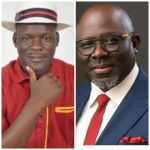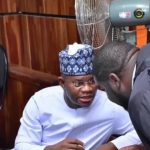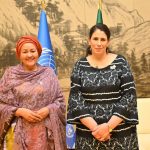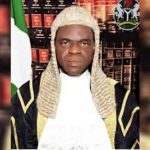Senator Echocho’s 2011 Governorship Trials and Kogi East’s Unlearned Lessons.
By Abdul Mohammed Lawal.
Born in the year of independence and growing up in Kogi State, at a time when it was still part of regions composed of other states, Senator Jibrin Isah Echocho experienced a world where rural markets, farming, and other primary activities were the only sources of livelihood. For most families in these rural areas, education was a luxury that only a privileged few could afford. In those days, travelling from Kogi villages to the few urban centres across Nigeria in search of greener pastures was a monumental task, often reserved for those fortunate enough to access formal education. This is the story of one of those few.
Senator Jibrin Isah Echocho’s story begins in his traditional hometown of Ajiolo, where he was recognised early on as a gifted child with remarkable aptitude and potential. His sharp intellect and natural talent were a source of pride for his family and community, who admired his early academic achievements. These accomplishments set the stage for a promising future, as Echocho’s dedication to his studies earned him the nickname translated as “A-class” within his community.
Growing up in an environment that nurtured his natural abilities, he excelled in school, consistently ranking among the top of his class. His teachers and peers often spoke of his sharp mind and determination, qualities that would later define his career. This strong foundation shaped his future, and earned him opportunities to pursue higher education, at a time when most of the people he started the journey with found solace in farming.
After an academic experience marked with a series of first-class degrees, Senator Jibrin Isah Echocho embarked on a distinguished career in the banking industry, where his intellect and strategic thinking truly shone. He quickly made a name for himself as a sharp mind in Nigeria’s financial sector, becoming one of the few whose career story became a reference point. His early roles in various banking institutions demonstrated his expertise in financial management, and he steadily rose through the ranks. Echocho’s ability to steer financial institutions towards growth earned him recognition across the industry.
This tenure in the banking world allowed him to build a reputation as a result-driven leader with a deep understanding of Nigeria’s complex economic landscape. At the height of his banking career, Echocho held key positions, including Executive Director at Afribank, where he played a pivotal role in the bank’s consolidation and capital market efforts. He also served as Managing Director of AIL Securities Limited, leading the firm to prominence in the Nigerian Stock Market. These roles allowed him to influence major financial decisions and policies, benefiting both the institutions he worked for and the broader Nigerian economy.
Beyond the technical aspects of banking, Echocho’s leadership was defined by his focus on human capital development and philanthropy. He believed in building the capacity of his team and mentoring the next generation of financial professionals. This commitment to nurturing talent meant that he often supported Kogites, creating opportunities for his people in the Nigerian financial sector whenever he could.
Senator Jibrin Isah Echocho’s banking success would later serve as a stepping stone for his attempt to secure one of the most influential positions in Nigeria’s financial landscape— the Governorship of the Central Bank of Nigeria (CBN). With his extensive career, economic expertise, and remarkable achievements in the financial sector, Echocho was a strong contender for the CBN’s top role. At the time, this was the only form of “politics” he engaged in, believing that this position would allow him to empower Kogites without the pressures of elected office.
However, like many high-level roles in Nigeria, the selection process for the CBN governorship went beyond qualifications and experience. Despite his impressive credentials, Echocho’s ambitions were derailed by external forces. The geopolitical dynamics within Nigeria, particularly the northern power structures, favoured another candidate, Sanusi Lamido Sanusi— who eventually secured the position. Echocho’s middle-belt origin worked against him, as he was not considered “northern enough” by the northern aristocrats for a role traditionally seen to favour candidates from the core northern regions.
The heaviest blow came from the Emir of Katsina, who had to put in words to a Katsina Nigerian President for a candidate of Fulani origin, rather than let it favour an Igala man. Despite this setback, Echocho remained undeterred. Rather than giving up, he saw this experience as motivation to continue serving his people, aiming to channel his experience and vision into the governance of Kogi State. This led him to pursue the governorship of Kogi State in 2011, under the People’s Democratic Party (PDP), marking the beginning of his formal political journey.
Echocho’s candidacy in 2011 was met with warmth, especially in Kogi East, where his reputation as an economic expert, a man of integrity, and his philanthropic gestures had already won him widespread support. He quickly became the leading contender for the PDP ticket and, and following an overwhelming win in the primaries, seemed well-positioned to clinch the gubernatorial seat. However, in a dramatic and unexpected twist, his political fortunes took a downturn, which many observers saw as the beginning of woes for the people of Kogi East.
The internal politics of the PDP, combined with shifting power dynamics at both the state and national levels, led to what many would later call a “betrayal” of his candidacy. Despite winning the PDP primaries, Echocho’s ticket was controversially withdrawn and the party had a second primaries. This was considered the biggest blow to democracy in Kogi State and an “absolute” use of power by an incumbent in selecting a successor. However, little has been said about it to this day. The party leadership backed a different candidate, His Excellency, Captain Idris Wada, leading to Echocho’s exclusion from the race, a decision that shocked many of his supporters.
This betrayal was not only personal but also symbolic of the political manoeuvrings and power struggles that have often shaped electoral contests in Nigeria. For Senator Jibrin Isah Echocho, this loss represented a significant political setback, one that tested his resilience. However, this disappointment did not mark the end of his political journey. Instead, it served as a catalyst for his later rise to national prominence as a senator, thanks to the wisdom of His Excellency, Alhaji Yahaya Bello, and the “New Direction.”
Sources close to the situation have rumoured that his daughter was getting married to the son of the PDP’s biggest rival in Kogi State, and Echocho wasn’t bold enough to inform Alhaji Ibrahim. I wonder if this was a good enough reason, considering that both His Excellency, Alhaji Ibrahim Idris, and his predecessor, His Excellency, Prince Abubakar Audu, were longtime friends outside politics. Others have said that Echocho’s 2011 candidacy was actually planned from the start, which is why the then-incumbent governor prevented any of his in-laws, the three Wadas (Dr., Engr., and Capt.)— from participating in the initial PDP primaries.
Elected to the Nigerian Senate in 2019 to represent Kogi East Senatorial District, Echocho quickly established himself as a formidable force in the upper chamber. The Distinguished Sen Jibrin Isah Echocho has been praised for his contributions on the floor of the Senate, where his knowledge of economics and governance has been evident.The standout aspects of his work for me has been his focus on human capital development, to ensure that the youth of Kogi East have access to opportunities for growth and advancement. His numerous initiatives in skills acquisition, scholarships, and business grants have empowered thousands in the region, creating pathways for sustainable livelihoods.
Interestingly, under the watchful eye of His Excellency, Alhaji Yahaya Bello, the All Progressives Congress (APC) produced the same son-in-law, Prince Shuaibu Abubakar Audu, who became the incumbent Minister for Steel Development. How then will you blame a statesman betrayed by his own clan for appreciating his benefactor by saying “he was being over rewarded”, when this feat was achieved?
I will end this piece with words from an address given by Prof. S. U. Ogbo (Dr Usman Ogbo) in the Igala Youth House ahead of the 2023 Kogi State Gubernatorial Election: “The political elites of Igalaland have maintained their established status quo from 2003 to the present day. They will champion a prosperous son of the land to their self-fulfilling interests in the name of seeking elections, only to mock him after draining his life away.” Examples include Alhaji Isa Guinness and Engr. D. U. Muhammed of 2003, and Alhaji Sani Teidi and others in later years.
The “New Direction” government reduced the influence of many of these individuals as new leaders emerged in Kogi East. The 2023 Kogi State gubernatorial election renewed the regional relevance of some of these people, and while the average Igala man desires an Igala governor, these individuals are already looking forward to who they will exploit in 2027. What do we really want?
Thank you, His Excellency, Alhaji Yahaya Bello, for all that you have given to Kogi State. Thank you for the gift of the “Continuity and Consolidation” administration of His Excellency, Alhaji Ahmed Usman Ododo. Kogi State can only get better from here.












